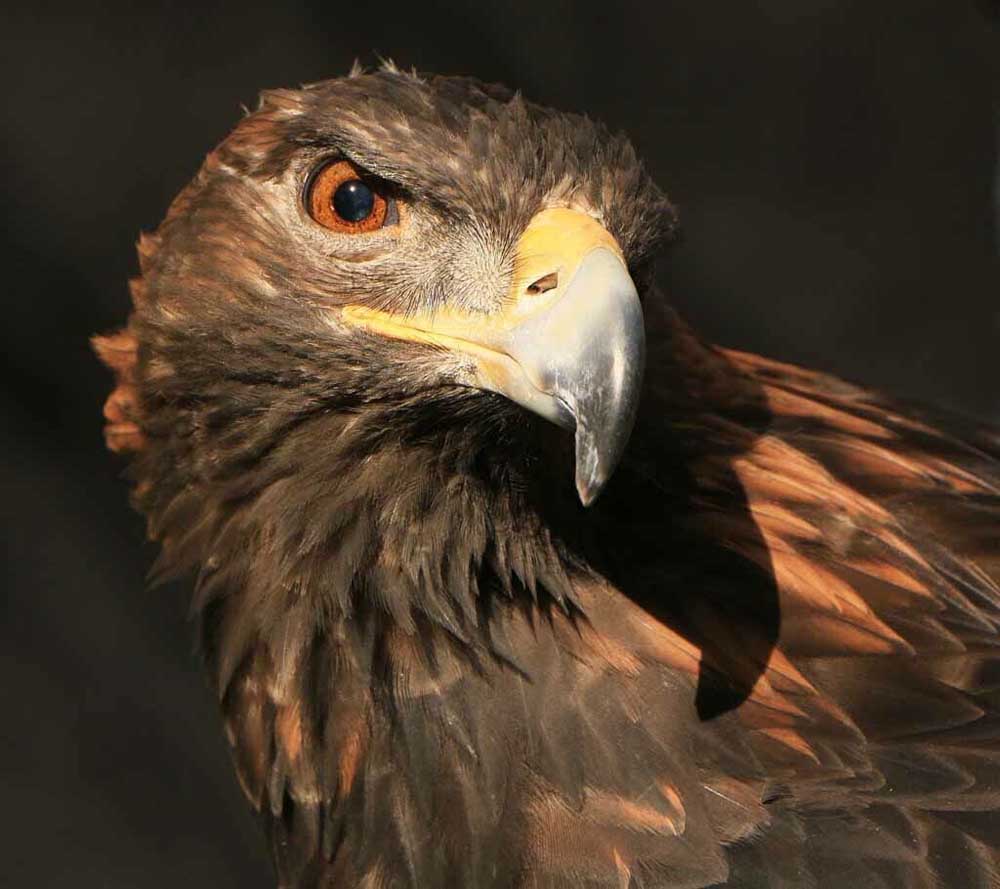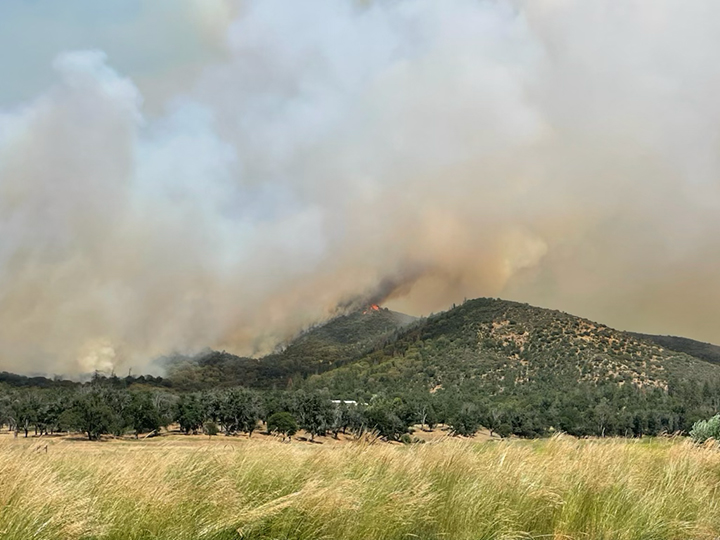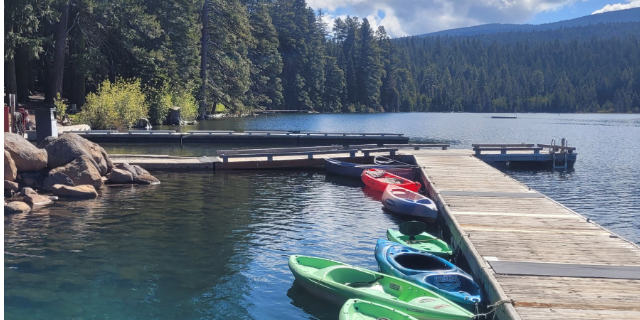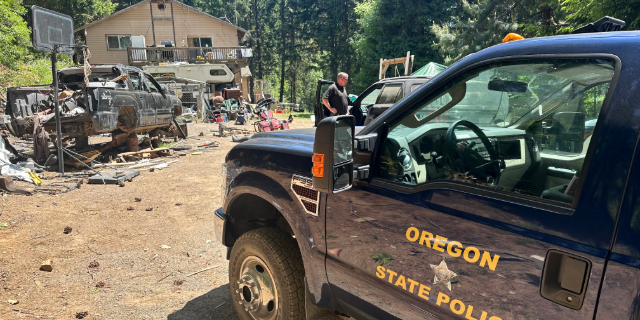Sunriver Nature Center says goodbye to Aquila the golden eagle
Published 5:00 am Sunday, February 4, 2024

- Aquila, the golden eagle at the Sunriver Nature Center, died Jan. 26. She had lived at the center since 2009.
Sunriver Nature Center staff have said their final farewells to their beloved Aquila, the golden eagle who has lived there since 2009.
Handlers estimate Aquila was 49 when she took a sudden decline at the beginning of this year. On Jan. 26, she “peacefully passed away in her sleep,” said the center in a news release.
Her loss left staff — both current and former — devastated.
“I think the biggest takeaway from her legacy is that people were invested in her. She just had a way of garnering people’s respect and attention,” said Kelli Neumann, Sunriver Nature Center’s programs director and Aquila’s primary handler for the last four years.
Neumann, and others who worked with Aquila, said the eagle was bright, patient, playful and one of the most loving birds they have worked with.
Aquila’s life comes full circle
If staffers at the Sunriver Nature Center had not been curious about where Aquila had come from, after she arrived in 2009 from Montana, they never would have known the connection she already had to the center. She was the same young eagle Jay Bowerman, who was a field researcher with the center at the time, had cared for 25 years earlier.
“I started going through her permit information because I was trying to gather background and stories about each of the birds. As we started putting the pieces together, we had our minds blown about how Jay had taken care of her so many years earlier,” said Jennifer Curtis, who was a nature center employee when Aquila arrived.
Curtis discovered that Aquila actually first came to the center in 1984 from Fort Rock, Oregon. Still very young, she had done what all eagles do when she spotted a fresh deer carcass: she descended for the feast.
But Aquila was unaware of the danger of feeding alongside a road, and the vortex of wind produced by a passing semitruck sucked her back towards the road, where she was hit by a car.
“It’s really common for big winged birds, such as eagles or vultures, to come down to roadkill or some sort of carcass. And when it’s near a road, it can be really dangerous for them because of those wind currents,” explained Neumann.
After the accident, Bowerman and other staff did everything they could to heal Aquila, but there was nothing they could do to fix her detached retinas.
“Because she was structurally sound, we were able to find somebody that wanted her for an exhibit bird … and that was all we knew of her until 2009 when Rob Bingham — who was the nature center manager at the time — went in search of an exhibit bird to replace a bald eagle that had died in an accident at the nature center,” Bowerman said.
Aquila’s deep love and playful personality
Golden eagles are known to be more docile than bald eagles. But Aquila was something different altogether.
“Considering that she was blind, she could have been a very scared and skittish animal, but she was one of the sweetest animals I’ve ever worked with. She seemed to know who was around and who to connect with. She was really personable with everybody,” Curtis said.
When Curtis was having a bad day, she would sit with Aquila in her enclosure. She remembered that when she cared for Aquila, the eagle would cluck — almost like a chicken — and the interaction would always cheer her up.
“Eagle vocalization is kind of a unique sound. It’s not what you would expect. It’s a soft kind of sound,” Neumann said, as she imitated one of Aquila’s calls of recognition. “It was funny. She must have known our gait, or maybe she could see some sort of shadow and identify people, but she was definitely keyed into the people in her little sphere.”
Curtis felt she had a bond with the bird.
“She was so playful. One of the funniest things I’ve ever seen her do is she had a smaller bath at one point, and she just shoved herself into this small bath and used her wings to get water all over her back and fluff herself up,” Curtis said. “She was very expressive with her feathers … She would flip her head upside down and start making little chirping noises and contort herself into weird directions just being a playful bird.”
The ups and downs of egg-laying
About a year after Aquila returned to Sunriver Nature Center, Bowerman and the staff noticed she was feeling depressed. During a medical checkup, they discovered she had an impacted egg.
Keen to help Aquila avoid surgery, Bowerman brought her to his home. In consultation with a veterinary expert, Bowerman took Aquila into his downstairs bathroom, where he performed a therapeutic procedure he had read about that can help birds dislodge an impacted egg. He cranked up the heat to 100 degrees and ran the shower to increase the humidity.
“Lo and behold, all of a sudden, there’s a great big egg on the floor, and she immediately perked up and began to eat,” Bowerman said.
Every year after, Aquila would lay several eggs. Neumann said she became a dedicated nest builder even though all of Aquila’s eggs were infertile. Volunteers were always keen on ensuring she had all the sticks she needed in the spring to build a nest to her satisfaction.
“We have a core group of dedicated volunteers who help clean enclosures and feed and take care of the animals. Of course (Aquila) was a very popular bird, and people wanted to make sure she had all the materials she needed for her nesting,” Neumann said.
Aquila’s legacy
Most golden eagles only live to be about 20, but not Aquila.
“I think the fact that she lived to be 49 years old is phenomenal. Eagles can live into the mid-40s in captivity, but she might very well be the oldest bird in captivity. I did some research yesterday, and I hadn’t seen one closer to the 50-year-old range,” Curtis said.
As a researcher, Bowerman learned that golden eagles were used extensively for hunting in the Ural Mountains in Russia and some had outlived numerous handlers. But he added that anecdotal records aren’t scientific enough to determine the potential lifespan of these birds.
“We don’t know, but it does suggest that (they can live) certainly multiple decades … and in circumstances like was the case with Aquila — because they were not left to have to survive on their own and deal with all of the threats — living 40 or 50 years is certainly very credible,” Bowerman said. “Whether they can live much longer than that is an open question.”
Over the years, Neumann estimates Aquila visited hundreds — if not thousands — of classrooms.
“And in all of those programs, we always talked about things that the general public can do to preserve the wild eagle populations across the country, like how to reduce lead poisoning or slowing down when you are driving by roadkill. So the legacy is, she was out there helping wild eagles, as well as by helping people know what they can do to protect them,” Neumann said.
What comes next?
Because eagles are protected by federal legislation and sacred to many Native Americans, Aquila’s body will be sent to the National Eagle Repository, which oversees the Native American Eagle Feather Program.
Neumann explained that Aquila’s molted feathers have always been gathered and sent back to the repository, which then distributes them for various Indigenous ceremonies. The same will be done with Aquila’s remains.
The question of what comes next for the Sunriver Nature Center is somewhat more complicated, Neumann said. Because Aquila was blind and rarely flew, her enclosure wouldn’t be suitable for another rescued eagle. To bring on another educational ambassador, the center would need to build it a new home.
But a new enclosure could happen with donations being sent through the Aquila Memorial fund, and rescuing another eagle is something the center is considering very seriously. Federal regulations make permits and licensing to keep an eagle cumbersome to obtain, and any handlers must have 500 hours of eagle handling. Because the center has so much experience with Aquila, the process would be easier than average.
“There’s always eagles like Aquila out there looking for a facility to take care of them, who have been compromised in some way and can’t live in the wild anymore, but their lives can still be really valuable. So we hope we can continue that,” Neumann said.






